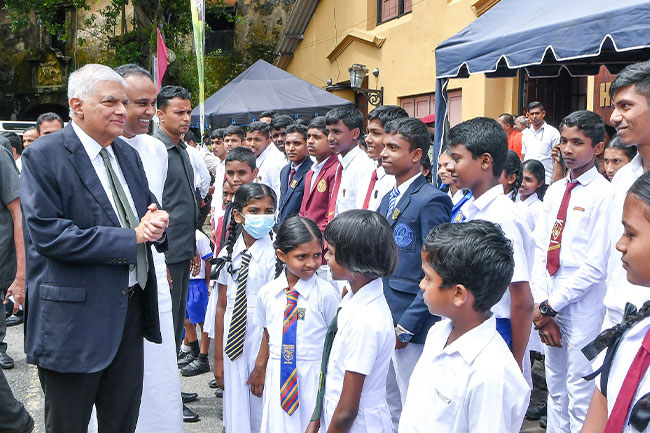200 smart classrooms and 2,000 Tabs for Southern Province schools
Posted on July 6th, 2024
Courtesy Adaderana

President Ranil Wickremesinghe emphasized the necessity of an advanced education system combined with modern technology to move the country forward with a new economy. He noted that educational reforms are currently underway to achieve this goal.
President Rani Wickremesinghe made these remarks today (06) during a ceremony at Hall De Galle in Galle. The event marked a significant step towards educational modernization, with the provision of 200 Smart Classrooms and 2000 Tabs to 200 schools in the Southern Province.
Following a request by the Minister of Health and Industry, Dr. Ramesh Pathirana, the Government of India allocated RS. 300 million to the Southern Provincial Council for this project.
Of the 200 schools selected schools, 150 are in the Galle district, while the remaining 50 schools are in the Hambantota and Matara districts.
Additionally, 2000 Tabs were distributed, with each of the 200 classrooms receiving 10 tabs.
Symbolizing this occasion President Ranil Wickremesinghe presented a commemorative gift to the Indian High Commissioner, Mr. Santosh Jha.
In his further remarks, President Wickremesinghe stated:
Currently, the world is advancing rapidly with modern technology. Consequently, our country’s education system must also progress in tandem with these technological advancements. The Ministry of Education has already initiated necessary educational reforms to achieve this goal.
In the past, we introduced several educational policies that were appropriate for their time. However, given the current technological advancements of today, there is a pressing need for new reforms in the education sector to ensure our education system remains relevant and effective.
Thus far, we have launched the establishment of Artificial Intelligence (AI) clubs in schools. Countries such as England and America began integrating AI technology years ago. To ensure the sustainability of our newly launched AI program this year, it is essential for teachers to undergo comprehensive training. The government is actively developing training programs and infrastructure to bolster this initiative. There is also a plan to elevate existing Central Colleges and National Schools into specialized institutions focusing on artificial intelligence.
We deeply appreciate the support extended by neighbouring India in advancing modern technology. Prime Minister Narendra Modi has expressed interest in establishing an Indian Institute of Technology (IIT) campus in Sri Lanka, which is highly appreciated.
Additionally, negotiations to enhance cooperation in the energy sector with India are progressing successfully. I had discussions with Mr. Elon Musk in Malaysia, and his internet technology is anticipated to be introduced in Sri Lanka following Parliamentary approval.
This development will facilitate the provision of technical education to students in remote areas. Presently, the Southern Province has emerged as a region showcasing exceptional educational talent. Today, the first Dutch school in the Southern Province has evolved into Baddegama National School.
By leveraging modern technology to nurture future-ready generations, we aim to position our country as a global leader.
Minister of Education Dr. Susil Premajayantha:
The Free Education Act has brought about a transformative change in Sri Lanka, significantly increasing the literacy rate from 46% to 93%. In today’s technological age, the integration of Artificial Intelligence and modern classrooms is crucial. We appreciate India’s assistance in this endeavour.
Today, 200 schools in the Southern Province have been equipped with comfortable classrooms and 2000 Tabs. Moving forward, the schools will undergo digitization, with selected 1250 schools already being connected. Over the next three years, we aim to digitize 10,026 schools and provide necessary teacher training. Graduates with technical expertise from our universities enjoy a 93% employment opportunities in the job market. We must seize the opportunity to lead globally through modern technology”.
Minister of Health and Industry Dr. Ramesh Pathirana:
We deeply appreciate the Government of India for their support in this endeavour. We are currently experiencing one of the greatest periods of this century. The Free Education Act introduced by a former Minister of Education Mr. C. W. W. Kannangara, a native of Galle, significantly increased school enrolment from 52% to 99%.
The numbers of schools expanded from 3000 to 10,000, and instead of a single government university, 13 universities were established. Annual university admissions surged from 250 to 45,000 students. This transformation has propelled Sri Lanka from lagging behind in the global industrial revolutions to progressing alongside the world.
In the next century, leveraging Artificial Intelligence, computer knowledge and modern technology presents an opportunity to advance in parallel with the global community. A Smart educational framework must be established to achieve this goal. President Ranil Wickremesinghe is currently spearheading educational reforms with a visionary approach.
Indian High Commissioner to Sri Lanka, Mr. Santosh Jha:
As India’s neighbour, we consistently extends support to Sri Lanka. Sri Lanka holds a crucial position in our foreign policy. India remains steadfast in its commitment to providing essential infrastructure and technical knowledge support to Sri Lanka.
The event was attended by Deputy Speaker Ajith Rajapaksa, State Minister Mohan Priyadarshana, Member of Parliament Sampath Athukorala, along with a delegation of education officials, principals, and students from the Southern Province.